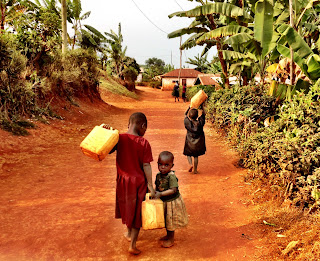Rwanda is real
When people at home ask me how Rwanda is, I’ve often used
the word “real” to describe it. It seems to me that so often in America, many things are hidden from us, sometimes by chance, often on purpose. It’s not that life in America is all fake, it’s
just that I can see the consequences of all my actions so clearly here. Let me
explain.
In my village, any water that you use, you must walk to a
nearby water station, wait in line with your jerrycan, and tote that heavy
water all the way back to your house. Want that water heated? You might have to chop down a tree to get firewood
to boil it. Any trash that you create, you have to dispose of yourself—either
burning it or burying it. On one of my first days in my host family, I ate a
granola bar and then foolishly asked my Mama where the trash can was. She didn’t
understand, even though I looked up the word for “trash” in Kinyarwanda, and
repeated it in French too. She took the wrapper and just threw it in our
backyard. I thought about an
average day in America, and what my backyard would look like if I had to toss
all my trash there instead of the “out of sight, out of mind” model, where regular
garbage pick-up, waste incinerators, and massive landfills assure us that our
consumptive habits are not a problem. It has made me so much more conscious of
what I consume.
In America, you can buy paper without ever seeing the trees that were cut down; you can buy produce without ever seeing the chemicals that were used or the workers who harvested the food. You can buy a hamburger without ever seeing the cow, or a speck of bones or blood. You can use electricity as much as you want, often without knowing where it came from, without seeing the mountaintop removed, the lung cancer of miners, the kids with asthma who live next to the coal plant and who can’t afford health insurance.
Cost is the only barrier: if you have the money in America
(and in most developed countries), the environmental and human costs of
consumption do not stand in your way. Everything is clean and sanitized on the outside;
because that’s the way we like it. It makes us uncomfortable to think about the
effects of our actions on people that we’ve never met, and in all likelihood,
will never meet. I just wonder how different the world would be if, for example, we had to
meet the person in a developing country making a few cents a day making our
shoes every time we wanted to buy them, or if we had to meet people whose water or land was ruined because of an oil spill every time we wanted to fill our gas tanks.
It just seems like there’s a huge disconnect somewhere along
the line. And in many ways, I don’t know what to do about it. Let me rephrase that. We know what to do about it, it's actually doing it that's the hardest part. And it’s scary, looking
it in the face. "Reduce, reuse, recycle", people. In that
order.
I think sometimes of the quote by Gandhi that has almost
become a cliché, “Be the change you wish to see in the world.” It has taken on
a different meaning for me after being here for four months. I often wonder if
everyone on the entire earth were an exact replica of me (even scarier than all
that stuff I just wrote about, I know), would the world be able to sustain
itself? If everyone had a laptop (as I do), if everyone had five pairs of shoes
(as I do), if everyone wanted to take hour-long hot showers (as I desperately
want to right now instead of a 5 minute bucket bath)? Not likely.
So many things in America are possible because we are
separate from the consequences of our actions. And it’s all real, whether we
choose to see it or not.












Great post.
ReplyDeleteGreat post! I hope this doesn't sound crazy, but I support a zero-waste lifestyle. At least, as close as I can. Check out this website where I got my ideas: http://zerowastehome.blogspot.com/. They add on "refuse" to "reduce, reuse, and recycle." Refusing to take or buy stuff that's going to be waste is the hardest part, I think.
ReplyDeleteSi fa fatica a credere che ci sono popolazioni che non hanno l'acqua potabile per bere, mentre da noi c'è un spreco incredibile!! Complimenti per ciò che stai facendo!!
ReplyDeleteUn caloroso saluto....ciao